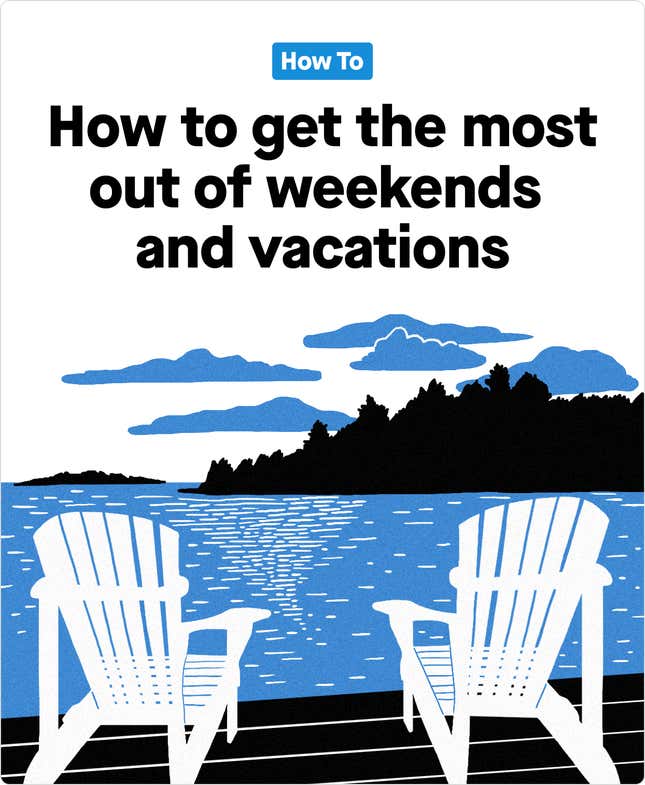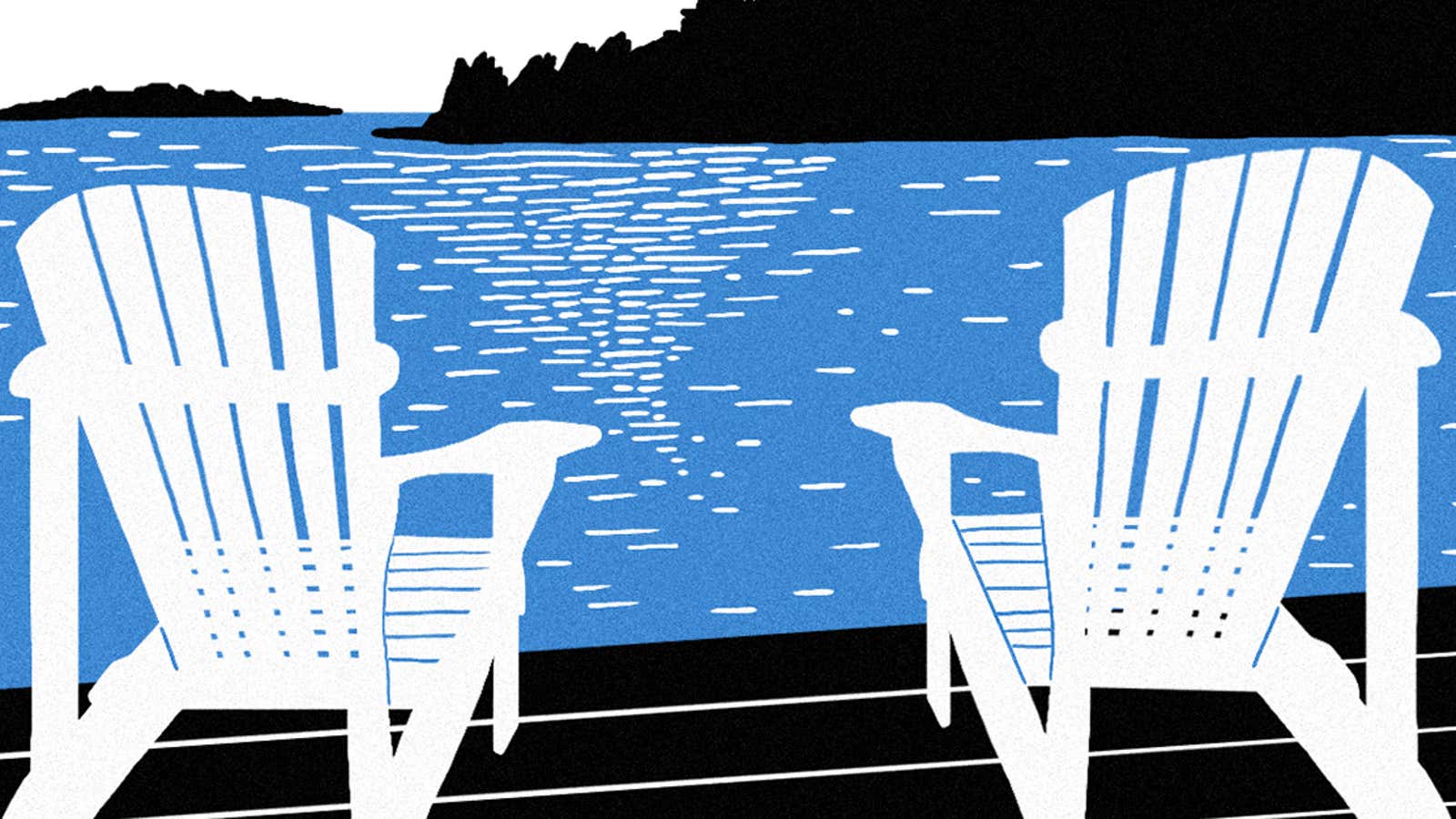
In Joshua Ferris’s 2013 short story “The Breeze,” a New York City woman tries to live her life to the fullest on a beautiful spring evening. In one timeline, the woman and her husband try to picnic in Central Park but are stymied by subway delays. In another, she grows furious at her husband’s suggestion that they see a movie on such a rare and perfect day. “Night after night she was anxious not to miss out on…what?” Ferris writes. “She didn’t know.”
Many of us have experienced a version of this feeling of having eagerly awaited some free time, only to find it quickly slipping through our fingers. But whether you struggle with FOMO, an over-stuffed schedule, being tethered to your phone, or simply feeling adrift during unstructured days, the answer to getting more out of weekends and holidays is the same: Find ways to experience time as gloriously abundant. Here’s some of the best advice we could find from psychologists, time-management experts, and even a celebrity or two.
If you’ve got kids and a hectic schedule
For people with lots of family obligations, the problem with vacations and weekends may be trying to squeeze so many activities in that it seems like there’s no downtime. If that issue sounds familiar, try making use of the time-tracking spreadsheet strategy developed by Laura Vanderkam, author of the book 168 Hours: You Have More Time Than You Think.
As a parent of five children, Vanderkam writes, her weekends often felt incredibly hectic. But tracking her time helped her identify the windows when she could unwind in the ways she finds most enjoyable. “I’d see that I might have two to three hours to spare after my kids went to bed each night,” she writes for Forge. “Knowing that encouraged me to think about how I might use this time—and make sure I always had a good book or a puzzle going so those hours wouldn’t disappear into random email checks or tidying toys that would only come out again the next morning.”
If you want time to slow down
One of the best ways to prolong your experience of weekends and holidays may be to spend some quality time with trees. A 2017 study published in the Journal of Environmental Psychology found that taking a walk in nature feels like it lasts longer than taking a walk of the same duration in a city. While study participants reported that both kinds of walks reduced their stress levels, they felt more relaxed and in a better mood after the nature walk compared to the urban stroll.
If you’re feeling a bit more ambitious, you might strike out for scenery that inspires not just appreciation but downright awe, from vast mountain vistas to roaring waterfalls: Research shows that when we experience awe, we feel richer in time and more attuned to the present.
If you have a hard time unwinding
Consider giving yourself the gift of a “should-less day,” per actor Ellen Burstyn. On a 2014 episode of the podcast “Death, Sex, and Money,” the octogenarian Academy Award winner explained that she balances out her busy work schedule with days on which “I do only what I want to do, if it’s nap in the afternoon or watch TV and eat ice cream.” While some of us need no extra motivation to loaf around our living rooms, Burstyn says that she finds designating such days a helpful way to combat the guilt she often feels when she’s trying to relax. “So when that voice goes off and says You’re being lazy, I turn to the other wiring in my brain that says No, this is a should-less day, and I’m doing what I want.”
For a little inspiration about what a truly should-less day can look like, try perusing comedian Vanessa Bayer’s iconically honest account for the New York Times of how she spends her Sundays. (It involves ordering delivery bagels and watching a lot of reality TV.) The upshot: There’s nothing wrong with taking it easy on the weekend; the key is to make sure you’re taking pleasure in doing so rather than passively letting time wash over you.
If you feel adrift
If vacations sometimes leave you feeling aimless, try traveling with a lens, as former Quartz reporter Nikhil Sonnad suggests.
Sonnad explains that spending just a week or two in a new place can often leave people feeling as if they’ve only experienced a superficial version of their destination. But choosing to pursue a particular topic or theme—be it literary history or shopping for wedding dresses—can make you feel more engaged with a region and the people who live there. “You will be encountering locals who have a shared interest with you, whether it’s coffee or techno music or tropical birds, and you will readily strike up interesting conversations,” Sonnad promises. Among his suggested themes:
- Chinese calligraphy in China
- Cave paintings in France
- Coffee in Kenya
- Slavery in the American South
- Tropical birds in Brazil
- The history of techno music in Detroit
- Mezcal in Mexico
- Following Simón Bolívar through South America
- The Mekong River across southeast Asia
- Antarctic ocean life in Argentina
- Immigration in New York
On a smaller scale, the same theory can be applied to weekends, too: Why not devote yourself to finding your city’s best french fries this fall, or touring different vineyards?
If you want to make your memories last
Whether you’re heading for the beach a few hours away or a multi-country tour, go ahead and spring for a souvenir or two that you can display prominently in your home, and make sure to print out a few favorite photos to frame or tack up on the fridge. A 2016 study published in the Journal of Personality and Social Psychology finds that we often don’t spend as much time reminiscing about our experiences as we think we will—but that physical reminders keep our happy memories more readily accessible. (The authors note that posting photos on our social media feeds doesn’t have the same effect.)
Learn more
The most relaxing vacation you can take is going nowhere at all
It took a century to create the weekend—and only a decade to undo it
How to make the weekend feel longer
How to stop looking at your phone
A vacation re-entry survival guide
Have a great weekend,
—Sarah Todd, senior reporter (favorite travel lens so far: watching wildlife in Scotland)
One 🧳 thing
The happiness we feel even after a “very relaxed” holiday tends to last, at most, for two weeks. So remember that while taking vacations is important, it’s no cure for burnout—we need to incorporate work-life boundaries into our daily lives, too.
